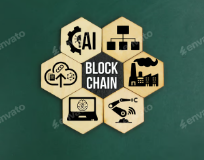Blockchain is a decentralized digital ledger technology that records transactions across many computers in a way that the registered transactions cannot be altered retroactively. Each transaction is grouped together in a block, and these blocks are linked together in chronological order, forming a chain—hence the name “blockchain.”
Key features of blockchain technology include:
- Decentralization: Unlike traditional databases that are managed by a central authority, a blockchain is maintained by a network of computers (nodes) that share the same information, making it transparent and less prone to single points of failure.
- Security: Each block contains a cryptographic hash of the previous block, along with a timestamp and transaction data, which enhances security. This makes it challenging to alter past blocks without detection.
- Transparency: Anyone with access to the blockchain can view the transactions recorded on it, which promotes transparency. However, user identities can be pseudonymous.
- Immutability: Once a transaction is recorded on the blockchain, it is very difficult to change. This immutability helps prevent fraud and increases trust in the data.
- Smart Contracts: Many blockchains, such as Ethereum, allow for programmable contracts that execute automatically when certain conditions are met, enabling more complex transactions and features.
Blockchain technology has a wide range of applications across various industries. Here are some of the most common uses:
- Cryptocurrencies: The most well-known application of blockchain is as the underlying technology for cryptocurrencies like Bitcoin and Ethereum. It enables peer-to-peer transactions without the need for intermediaries.
- Supply Chain Management: Blockchain can improve transparency and traceability in supply chains, allowing companies to track goods from production to delivery, verify authenticity, and reduce fraud.
- Smart Contracts: These are self-executing contracts with the terms of the agreement directly written into code. Smart contracts automatically execute and enforce agreements when certain conditions are met, facilitating transactions in various sectors, including real estate and finance.
- Healthcare: Blockchain can secure patient records while allowing for easy sharing between authorized parties. This enhances privacy, reduces fraud, and improves interoperability among healthcare systems.
- Voting Systems: Blockchain can be used to create secure and transparent voting systems, reducing the risk of fraud and increasing trust in the electoral process.
- Identity Verification: Blockchain can provide a decentralized and secure way to verify identities, helping to combat identity theft and fraud while giving individuals more control over their personal data.
- Financial Services: Blockchain is used for cross-border payments, streamlining transactions, reducing costs, and improving the speed and efficiency of payment processes.
- Real Estate: Blockchain can simplify property transactions, reducing fraud and paperwork by enabling secure record-keeping of ownership and transfers.
- Digital Assets and NFTs: Blockchain supports the creation and trading of non-fungible tokens (NFTs), which are unique digital assets representing ownership of items such as artwork, music, and virtual goods.
- Decentralized Finance (DeFi): This refers to financial systems built on blockchain technology that offer services like lending, borrowing, and trading without traditional intermediaries like banks.
These applications illustrate the versatility of blockchain technology and its potential to revolutionize various sectors by enhancing security, transparency, and efficiency.
